Christopher Lee, who sadly passed away last week at the ripe age of 93, was an actor I adored watching and listening to. I mention that last one particularly because for my money he had far and away the best basso voice in the business. His commanding delivery, authoritative diction, imposing height and self-confident air make him a natural to play authority figures, but he was apparently considered too tall to be leading man material. For years he was consigned to bit parts, occasionally making use of the six languages in which he was fluent (check out his agitated Montevideo bar owner in Powell and Pressburger's Battle of the River Plate), before an iconic role in a certain Hammer vampire movie changed everything for him.
It was after this that Lee became a bankable face, or more specifically a bankable horror face. Like Boris Karloff and Bela Lugosi before him, Lee's movie career was effectively defined by the movies that first brought him to public attention. It's these films that were the first to be quoted on his passing, something he himself predicted with a touch of weariness in an interview included on the VCI DVD of City of the Dead. But that's what happens when you are as good an actor as Christopher Lee and you make such an impression at the breakout moment of your career. And while I have no intention of knocking his excellent work in the considerable number of non-horror films in which he has appeared, we miss the days when the genre had its own stars, its specialist directors and even its own studios. Lee he made a lot of films over the course of his career – I seem to remember that at one point it was estimated that he had been in more films than any other living actor. But for so many he was a horror star, and one of the very finest the screen has ever known.
Since I first learned of Lee's death I've found myself looking back and trying to pin down which of his performances I enjoyed the most. It's taken quite a while because there are just so many. Indeed, I can't readily recall a single film in which Lee didn't impress (the same is also true of his favourite co-star Peter Cushing), and narrowing the exemplars down to five proved an impossible task. I've thus just picked five that I have a personal affection for, all of which I'd enthusiastically recommend as strongly for their qualities as cinema (or in one case television) as I would for Lee's work in them. There are so many more I could have included here. The first three are inevitable and probably on a thousand other lists too, but there are damned good reasons for this. And thus with apologies to Mr. Lee's memory, I just have to start with...
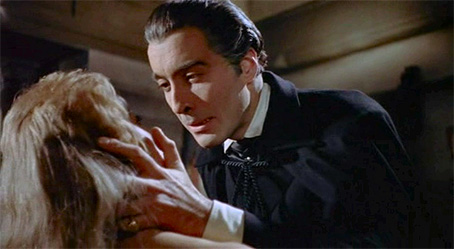
Dracula (Terence Fisher, 1958)
Oh come on, how could I not include this? The Curse of Frankenstein may have been the film that first brought Lee's name to the attention of the viewing public, but buried as he was under monster makeup there, it fell to Dracula to put his face up on billboards. And Dracula is dynamite horror cinema and a proved real game-changer for the vampire sub-genre. Gone was the legacy of Bela Lugosi's slow-moving, Hungarian-accented nobleman in favour of a well-spoken lord of the manor who transforms into a hissing feral predator with the strength of a gorilla and the speed of a gazelle. His entrance is one of the best and most unexpected in horror history – he appears dramatically and ominously at the top of a staircase before a startled Jonathan Harker, then swiftly descends and politely greets his guest – and it's often forgotten that following his first appearance in full vampire mode just 14 minutes into the film, he doesn't deliver another word of dialogue. Along with his title role in Hammer's The Mummy, this is probably Lee's most physically expressive and demanding performance.
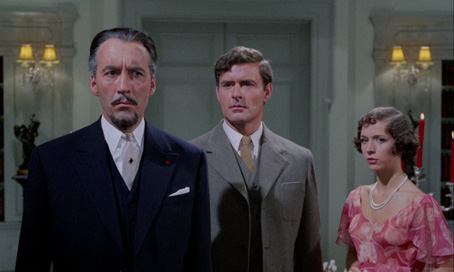
The Devil Rides Out (Terence Fisher, 1968)
Lee stars as cultured expert on the occult Duc de Richleau in a blistering tale of satanic possession and those who do battle with the forces of darkness. Smartly adapted for the screen by Richard Matheson from the novel by Dennis Wheatley and once again helmed by Hammer's premier director Terence Fisher, this was a role that showcased Lee at his most commanding – when he speaks in The Devil Rides Out, you listen. It's a genuinely thrilling genre work that still stands up today, and was originally intended to be the first of a series of film adaptations of Wheatley's De Richleau books, but its failure to ignite at the US box-office saw that plan shelved. Ironic, then, that it is now regarded as one of Hammer's finest works, and Lee himself claimed that this was his favourite role for the studio. Not hard to see why.
Blu-ray review >>
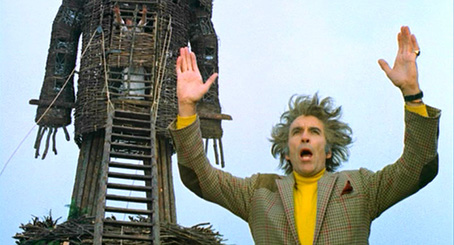
The Wicker Man (Robin Hardy, 1973)
Here Lee plays Lord Summerisle – from whom a former reviewer for this site borrowed his moniker – the laird of a remote Scottish island on which paganism still thrives and to where a devoutly Christian policeman (a superb Edward Woodward) travels to investigate the disappearance of a young girl. The film is now widely acknowledged as a genre classic and Lee is just wonderful here, notably in the scene in which he cheerfully baits an increasingly outraged Sgt. Howie over the island's pagan traditions, and it's his smiling conviction that the actions he and his fellow islanders are about to take in the film's astonishing climax that help to make it so bloody horrifying. Apparently this was Lee's favourite of all of his film roles. Who am I to argue?
Click here to read Lord Summerisle's DVD review.
Click here to read Camus's Blu-ray review.
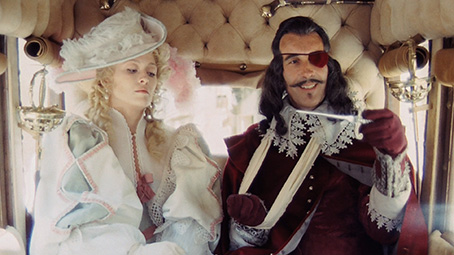
The Three Musketeers / The Four Musketeers (Richard Lester, 1973 / 1974)
You'd think it would be difficult for a supporting player to make his mark in Richard Lester's glorious, star-studded adaptation of Alexandre Dumas' superlative adventure story, but so well cast is the film that just about every one of them registers. Sporting long hair and an eye patch, Lee makes for an imposing and deliciously ambitious and manipulative Count De Rochefort, and in the process gets to be menacing, salacious and even deadpan humorous. He also gets to fight D'Artagnan in one of the second film's showpiece sword fights. The two films were and were shot together and originally planned to be released as one, but their combined length saw them shorn into two, which of course landed the studio twice the box office receipts but avoided chopping out scenes to reduce the running time. There are many of Lee's non-horror roles that I could have included here, but few are more fun that this.
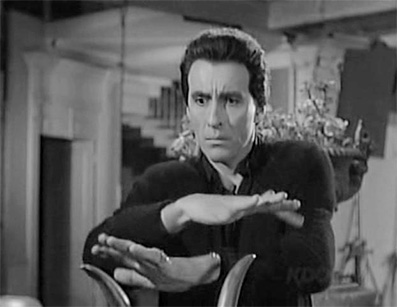
The Alfred Hitchcock Hour: The Sign of Satan (Robert Douglas, 1964)
Lee's first Hollywood job was not in movies but for television, as the credited lead of a particularly good episode of The Alfred Hitchcock Hour. Lee gets to flex his talent for accents as mysterious Austrian Karl Jorla, who is lured to Hollywood to appear in a horror picture after studio executives get their hands on a film he made in his homeland involving devil worship, one that has not been seen by the outside world. When he realises that he is to play the lead role and that his involvement will be publicised, Jorla becomes concerned for his safety and claims that members of the satanic cult of which he was once a member will attempt to take his life. The plot twists may be relatively easy to predict nowadays, but the episode still creates a most tangible sense of dread and the performances and handling are impressively low-key. It's Lee who is the least restrained here, but always in a manner that feels right for the character. This also offers a rare chance to watch Lee playing a potential victim, a switch of roles he handles well – when he barricades himself into a studio owned apartment in order to take a rest, the sense that we are watching a man genuinely in fear for his life is most convincingly captured. Despite the disappointment at not being directed by Hitchcock, it's an experience Lee apparently found immensely satisfying.
I'll leave you with this final thought, not from me but from my fellow reviewer Camus, from his 2005 review of the aforementioned Battle of The River Plate:
Also Christopher Lee pops up as a Uruguayan barkeep and I was reminded of his extraordinary career by virtue of my last two reviews (movies almost fifty years apart) and both featuring Christopher Lee. I hope he lives forever.
Amen to that. |